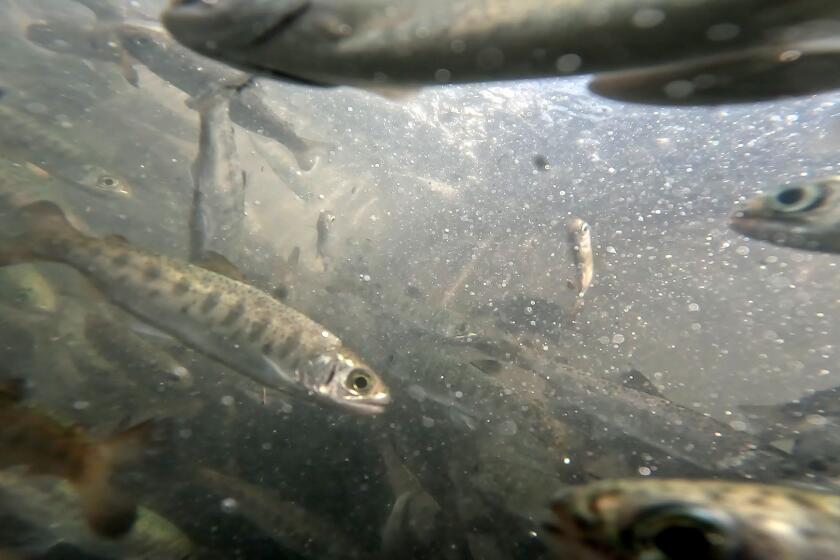Hunters Go Through Loopholes, Over Hills
On Saturday mornings in autumn, the English gentleman’s pleasure has long been to put on a bright red coat and ride out across the countryside on horseback, with a pack of friends in identical clothes at his side and a pack of hounds baying cheerfully ahead, chasing a friendless fox.
This weekend, thousands of men and women in red did it again, joining 200 hunts around the countryside to mark the first Saturday of a new season. But this time there was a difference. Hunting foxes with hounds had been banned by law in February.
Yet the new law is so full of loopholes that defiant hunters determined to ignore the ban were able to find ways of carrying on with their sport.
Under the 2004 Hunting Act, hounds can still chase a scent trail -- a sport known as drag hunting, in which a participant runs ahead of the pack daubing the trail with artificial scent. Hunters contend that they cannot possibly know if a fox crosses the drag-hunt’s trail and the hounds go after the fox instead of the artificial scent.
Hunts are even permitted to chase foxes, as long as participants shoot them humanely at the kill. What can they do, hunters say, if the hounds get to the fox before the man with the gun?
Hounds can also legally flush a fox from cover if hunters are out with birds of prey, officially engaged in falconry. At least 50 hunts have taken up falconry since February. Peter Heaton, joint master of the Cheshire Forest Hunt -- 36 riders and 31 hounds who went out Saturday with an 8-month-old hawk called Alice -- explained: “The hounds are not hunting, but they are flushing for the hawk to hunt. It is one of the ways we are testing the legislation.”
Delicate and sophisticated spirits have always been repelled by the pastime, which traditionally ended, if all went well, with the fox being ripped to pieces by the hounds. In the 19th century, the wit and playwright Oscar Wilde memorably mocked fox-hunting as “the unspeakable in full pursuit of the uneatable.”
But no one actually tried to stop it until the Labor government of Tony Blair came to power in 1997. His election manifesto included a promise to his party’s traditionally urban working-class voters, as well as to the middle-class voters it had begun to attract, to do away with a sport often seen as cruel.
Last year, the government, its popularity flagging after Blair took Britain to war in Iraq, tried to regain ground with voters by pushing anti-hunting legislation through a mutinous Parliament.
But getting a ban into law turned out to be more difficult than the government expected. It was not only opposed by country gentlemen and farmers who hunt, but also by a rural working community that supplies expertise and labor for hunts, which complained that “Townie Tony” was ignoring the needs of the countryside.
More unexpectedly, it was also opposed by human rights activists, left-wingers and libertarians who argued that a minority’s right to minority pursuits was being crushed by a heavy-handed and populist law. Numerous protests and marches almost stopped the ban from becoming law.
The Countryside Alliance, a lobby for the rural community that led resistance to the ban, claims that support for a hunting ban nationwide has fallen from 63% in 1999 to 45% two weeks ago.
The group laughs off claims by the League Against Cruel Sports that nearly half the hunts in England have broken the law since February. Research published by the BBC in September showed that none of the 317 official hunts in England and Wales have disbanded.
Candida Clark, 32, an elegant blond author, wears a green rubber wristband that says, “Stop The Ban.”
She began hunting only after the ban was introduced, she says, when a friend called her to say: “Darling, do you believe in democracy? Then come out with the hounds.”
“I grew up in Yorkshire, I’ve always ridden and probably always will,” she said. “This is nothing to do with being posh -- there are lots of people from every possible social class going out. It’s just a country thing. And banning it proves that Tony Blair knows nothing about the country.”
Sign up for The Wild
We’ll help you find the best places to hike, bike and run, as well as the perfect silent spots for meditation and yoga.
You may occasionally receive promotional content from the Los Angeles Times.



